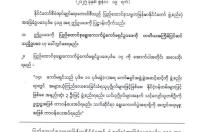
The upcoming elections are scheduled to be held nationwide according to the priority plan, except for areas with limited geographical conditions, the Union Election Commission (UEC) said.
In response to a question on which regions and states are planned to hold the general election scheduled for December 2025, the UEC provided the following information.
“Except for areas with limited geographical conditions, all regions and states are planned to be held in all regions and states, according to the priority plan. The upcoming elections are scheduled to be held in phases, and the dates for the elections will be determined in each phase,” the UEC said.
The elections to be held in December 2025 will use both the previous First Past the Post (FPTP) and Proportional Representation (PR) systems, the UEC said.
When asked how many of the 330 townships will hold elections, the UEC replied, “The elections will be held in the townships that can hold elections based on the prevailing security situation in the area at the time the election date is announced, and the areas that cannot. According to the current statistics of the Union Election Commission, there are 267 townships to be held.”
Regarding the voting system for the Pyithu Hluttaw, Amyotha Hluttaw, and the Region and State Hluttaws in the upcoming election, both the FPTP and PR systems will be used, as previously used, and more details will be available after the relevant Hluttaw election laws and regulations are promulgated, the UEC said.
In line with the new electoral system, constituencies will be defined for each region and state, and political parties will be able to compete in the election. The UEC said that the public will be able to vote at polling stations designated for each constituency.
In addition, the UEC said that it is working to enact and publish the relevant Hluttaw election law and by-laws that are consistent with the new electoral system, and that the Hluttaw representatives will be selected according to the constituencies where the election will be held. Details will be known after the law is enacted.
The Myanmar Electronic Voting Machine (MEVM) to be used in the upcoming election has been tested in central organizations, ministries, universities, social organizations in Nay Pyi Taw and nine regions and states, and political parties have also been tested. The UEC said that the voters can verify the results themselves and that there were no errors in the test votes.
In addition, the MEVM does not include internet, wifi and Bluetooth systems, and does not include Windows operating systems (OS) like computers. It is a microcontroller system, so it is a very simple and secure system. UEC also said that it is working to obtain national-level certification for the quality and standards of the voting machine in accordance with the Myanmar Standardization Law (2014).
















